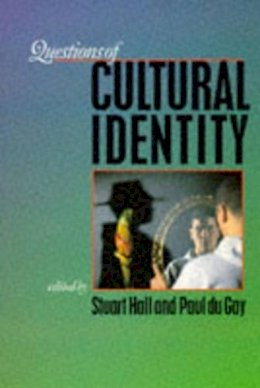
Stock image for illustration purposes only - book cover, edition or condition may vary.
Questions of Cultural Identity
Stuart Hall
€ 64.05
FREE Delivery in Ireland
Description for Questions of Cultural Identity
Paperback. An exploration of the issues surrounding cultural identity. It outlines the reasons why the question of identity is so compelling and yet so problematic. It interrogates different dimensions of the crisis of identity providing both theoretical and substantive insights into different approaches to understanding identity. Editor(s): Hall, Stuart; Du Gay, Paul. Num Pages: 208 pages, black & white illustrations. BIC Classification: JFC; JHM. Category: (P) Professional & Vocational; (U) Tertiary Education (US: College). Dimension: 234 x 158 x 11. Weight in Grams: 346.
Why and how do contemporary questions of culture so readily become highly charged questions of identity? The question of cultural identity lies at the heart of current debates in cultural studies and social theory. At issue is whether those identities which defined the social and cultural world of modern societies for so long - distinctive identities of gender, sexuality, race, class and nationality - are in decline, giving rise to new forms of identification and fragmenting the modern individual as a unified subject.
Questions of Cultural Identity offers a wide-ranging exploration of this issue. Stuart Hall firstly outlines the reasons why the question of identity is so compelling and yet so problematic. The cast of outstanding contributors then interrogate different dimensions of the crisis of identity; in so doing, they provide both theoretical and substantive insights into different approaches to understanding identity.
Product Details
Publisher
SAGE Publications Ltd
Number of pages
208
Format
Paperback
Publication date
1996
Condition
New
Number of Pages
208
Place of Publication
London, United Kingdom
ISBN
9780803978836
SKU
V9780803978836
Shipping Time
Usually ships in 4 to 8 working days
Ref
99-2
About Stuart Hall
Stuart Hall was born and raised in Jamaica and arrived in Britain on a Rhodes scholarship to Oxford in 1950. In 1958, he left his PhD on Henry James to found the New Left Review, which did much to open a debate about immigration and the politics of identity. Along with Raymond Williams and Richard Hoggart he established the first Cultural Studies programme at a British university in Birmingham in 1964, bringing the study of popular culture into the understanding of political and social change. After spending more than four decades as one of the UK’s leading public intellectuals, Hall retired from formal academic life in 1997 and since then has continued to devote himself to questions of representation, creativity and difference. He became the chair of two foundations, Iniva, the Institute of International Visual Arts, and Autograph ABP, which seeks to promote photographers from culturally diverse backgrounds, and championed the opening of Iniva’s new Rivington Place arts complex in east London in 2007. Paul du Gay is a Senior Lecturer in Sociology at The Open University
Reviews for Questions of Cultural Identity
`This impressive and timely collection of essays addresses the significance of cultural identity as social phenomenon and provides an insight into a number of new approaches for unfolding its complexity.... This is not only a collection of some of the most respected thinkers in the social sciences but reveals the variety of paths that can be followed in pursuit of the question of cultural identity′ - Sociology `This collection of essays brings together contributions from different disciplines and theoretical traditions in an effort to illuminate and advance the debate about cultural identity and its meaning in contemporary social formations. It is of value to those engaged in social and cultural theory, the social sciences, cultural studies, and the humanities′ - Sociological Abstracts `Hall′s opening essay is wide-ranging about theorisations of identities... Ten essay cover many different types of ground, often stimulatingly and at times surprisingly.... As a whole, though dispersed, the book well fulfills its aim to ask why "questions of cultural identity have acquired visibility and salience" across fields of research′ - The Times Higher Education Supplement
